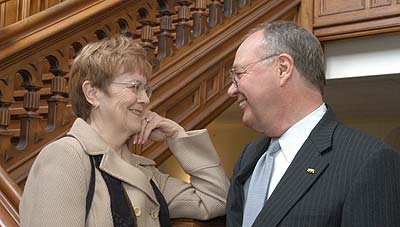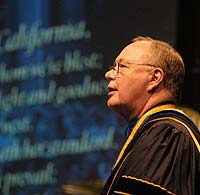UC Berkeley Web Feature
 |
Robert M. and Peg Berdahl, in South Hall, where the chancellor's father took classes as a graduate student. (Peg Skorpinski photos) |
From tears to togas: Campus honors outgoing Chancellor Robert M. Berdahl and his wife, Peg Berdahl
| Webcast: Watch the ceremony | 1 hour, 50 minutes |
BERKELEY – "This is a big moment for two kids from South Dakota who met in Sunday school over 60 years ago," Peg Berdahl told the assembled audience at Zellerbach Hall yesterday (April 15). Mrs. Berdahl fought back tears as she and her husband, UC Berkeley Chancellor Robert M. Berdahl, each received the Berkeley Citation, the campus's highest honor, for their service to the university.
The official occasion was a Charter Day celebration, marking the 136th anniversary of the university's charter, but the ceremony's true purpose was more poignant: to bid farewell to the outgoing chancellor. In June, Berdahl will step down from the office he has held since March 1997. After a sabbatical, he will resume teaching in the History department. His successor has not yet been named.
The ceremony began with the presentation of the 2003 Peter E. Haas Public Service Award to Corinne Jan, '76, for her work providing seniors and minority groups with access to health care, legal aid, and other services. In her acceptance speech, Jan kicked off two hours of tributes to the Berdahls from faculty, staff, students and the City of Berkeley community by thanking the chancellor for "courage and compassion that have sustained Cal through tragedy, terror, and war."
The speakers who followed Jan echoed her praise. Engineering professor Ron Gronsky, chair of the Berkeley Division of the Academic Senate, called Berdahl "a timely and patient consultant with faculty" who would leave behind a "tangible tradition of collegiality." The chancellor has also forged an excellent relationship with staff. Margo Wesley, Director of the Staff Ombuds Office, highlighted the many programs and activities he has championed on behalf of staff, including encouraging flex time for balancing work and life, the Outstanding Staff Award, the Career Development Opportunity Program, the annual campus memorial service, and the Clark Kerr Infant Care Center for faulty and staff that will be keystone of Peg Berdahl's legacy.
Spiky-haired Vincent Li, a fourth-year Molecular and Cell Biology major and a first-generation college student, thanked the chancellor for working with the California Alumni Association to launch the Achievement Award Program (TAAP) in 1998, making it possible for Li and other students from low-income families to attend Berkeley. TAAP has since welcomed 113 students - with significant personal contributions from the Berdahls.
An additional 36 future students will have the chance to attend Berkeley, thanks to a new scholarship established in the Berdahls' name by George Miller, a venture philanthropist and trustee of the UC Berkeley Foundation. Miller has been a generous backer of UC Berkeley students through the George A. Miller Scholars Program, serving low-income, first-generation college students who have transferred to UC Berkeley from one of the Bay Area community colleges. The new Robert M. and Margaret Berdahl Scholarship Program, Miller's gift to the couple with whom he attended high school, will begin in 2005 and run through 2014, offering 36 students a two-year stipend of just under $10,000 each.
The First Lady of Berkeley
Peg Berdahl has been as tireless in her service to the campus and the Berkeley community as her husband, said Irene Hegarty, director of Community Relations, who bestowed the Berkeley Citation on Mrs. Berdahl. In addition to hosting hundreds of dinners and events at University House and the endless rounds of public appearances with the chancellor, Hegarty said, Mrs. Berdahl has championed breast-cancer awareness programs and activities; served on the board of the campus's Young Musicians Program and work with the Early Childhood Education Program, University Community Partnerships, the University Section Club, and the YWCA.
 Peg Berdahl accepts gifts from children who attend the Clark Kerr childcare center she founded. |
Hegarty brought Mrs. Berdahl's legacy to life by ushering several young children from the Clark Kerr Infant Care Center on stage. The facility got its start in the summer of 1999 when the Berdahls were on vacation in New Mexico and happened to run into a UC Berkeley graduate student and her husband. The couples began chatting, and the student complained that, while she was grateful for the childcare assistance she received from the university, she wished there were a safe, on-campus place to which she could entrust her infant. Mrs. Berdahl returned to the university and immediately began pushing for such a facility, at one point volunteering the use of University House - her home - as the site when finding a location proved problematic. The Clark Kerr Center opened in August 2000.
Accepting the Citation, Mrs. Berdahl recalled a much less pleasant occasion seven years ago, when she arrived at University House to find an obscenity burned into the grass of the front lawn. Fearing a repeat of the violent machete attack on the previous chancellor, Chang-Lin Tien, she called the police. And called them, and called them. When an officer finally showed up, he was not concerned.
"He told me, 'Ma'am, this is April, this is Berkeley, it's going to happen,'" Mrs. Berdahl recalled, smiling before she compared the two bookending events. "And now, this is April, this is Berkeley, and something beautiful has happened!"
Berdahl's report card
For his keynote speech before accepting the Berkeley Citation, Berdahl also chose to revisit a previous April - the occasion of his inaugural address on Charter Day in 1998, a year after taking office. In the previous speech, he had outlined which of UC Berkeley's challenges he considered most serious and intended to address during his tenure.
 'This job has been the highest honor and greatest privilege I have ever had. I could not ask for more from life.' -Chancellor Robert M. Berdahl |
Saying he wanted to "look honestly at his successes and failures," the chancellor delivered a frank - if at times pitiless - self-examination of his performance over the past seven years.
The only areas with which Berdahl seemed unequivocally satisfied were the creation of new interdisciplinary research centers and the campus's increasing ability to attract private donations to offset declining state funding. UC Berkeley had "competed for and won more than one-third of California's resources for the Institutes of Science and Innovation," he observed proudly. He felt confident that the resulting Center for Information Technology Research in the Interest of Society (CITRIS), California Institute for Bioengineering, Biotechnology and Quantitative Biomedical Research (QB3), and other campus initiatives would generate life-and world-saving research for years to come. Meanwhile, in the past seven years, the campus has raised $1.5 billion, including 110 new endowed chairs and $200 million in student scholarships.
To Berdahl, the occasions for worry outweighed those for pride. In the area of faculty recruitment and retention, the campus had succeeded "beyond our wildest hopes," as supported by a laudatory recent article in the San Francisco Chronicle noting how UC Berkeley had beaten out Harvard and other elite private universities in attracting top professors, Berdahl said. But, he went on, "our salary system is frayed" by the monetary exceptions that had been made to win those stars, leaving older faculty underpaid by comparison and departments hobbled. "We have loyal faculty, but loyalty only goes so far," he warned.
The chancellor gave the university under his tenure high marks for its renewing of capital infrastructure, noting the more than a dozen new buildings that have broken ground or are in the works, and the many extensive renovations and seismic upgrades of existing buildings. The UC Berkeley Library, too, has blossomed under Berdahl after being universally acknowledged to be teetering on a budgetary precipice when he arrived.
"We've invested substantial resources and climbed back into third place [among university libraries], behind only Harvard and Yale," he said, before again cautioning the assembled audience not to feel complacent. The current state budget crisis and its catastrophic effects on Cal have again placed the Library in danger, he said, and "our ability to sustain this success is precarious and will take campus dedication."
The budget crisis has and will continue to cripple the progress that Berdahl felt he had been making on staff issues aimed at reducing university bureaucracy . "Our report card on this endeavor may show improvement, but there is still room for significant improvement," he said. "We have made progress in human resources and are working hard at staff compensation and reclassification. . [But] our staff was overworked before the current budget crisis and is working even harder now."
Referring to a praise-filled report last month from the Western Association of Schools and Colleges renewing the university's accreditation, Berdahl said he felt he had fulfilled his promise to improve departments' ability to support the teaching and basic needs of their faculty. Then he once again pointed to the lead lining in the cloud: despite technological advances that had made large-scale lectures more accessible and other teaching steps forward, "the physical state of many of our classrooms is inadequate to fulfill teaching needs."
Failure to achieve diversity
Berdahl reserved his harshest self-criticism for his performance regarding what he sees as the very foundation of this university. In his inaugural address, he had asked, "While it is not our mandate to mirror precisely the population of California, how are we to sustain public support if we do not better represent the impressive diversity that distinguishes this state?" and gone on to state an educational, moral, and public obligation "to make certain that we are accessible to students of all ethnic backgrounds and experiences."
| Farewell Remarks |
Seven years later, he said, "it pains me to admit we have largely failed in these endeavors," as evidenced by the low numbers of African American and Latino students at Berkeley. Berdahl believes that despite outreach efforts, many schools are not preparing students adequately for prestigious universities, and this trend is destined to only worsen in the current budget climate. Already there has been one immediate, devastating effect: "For the first time since adoption of the Master Plan for Higher Education, the University of California cannot guarantee admission to all eligible students," Berdahl said quietly.
He repeated the same quotation from the educator and political philosopher Hannah Arendt that he had also included in his April 1998 address. "I've used this so often you've all probably heard it before," he told this year's audience, "but it bears repeating."

